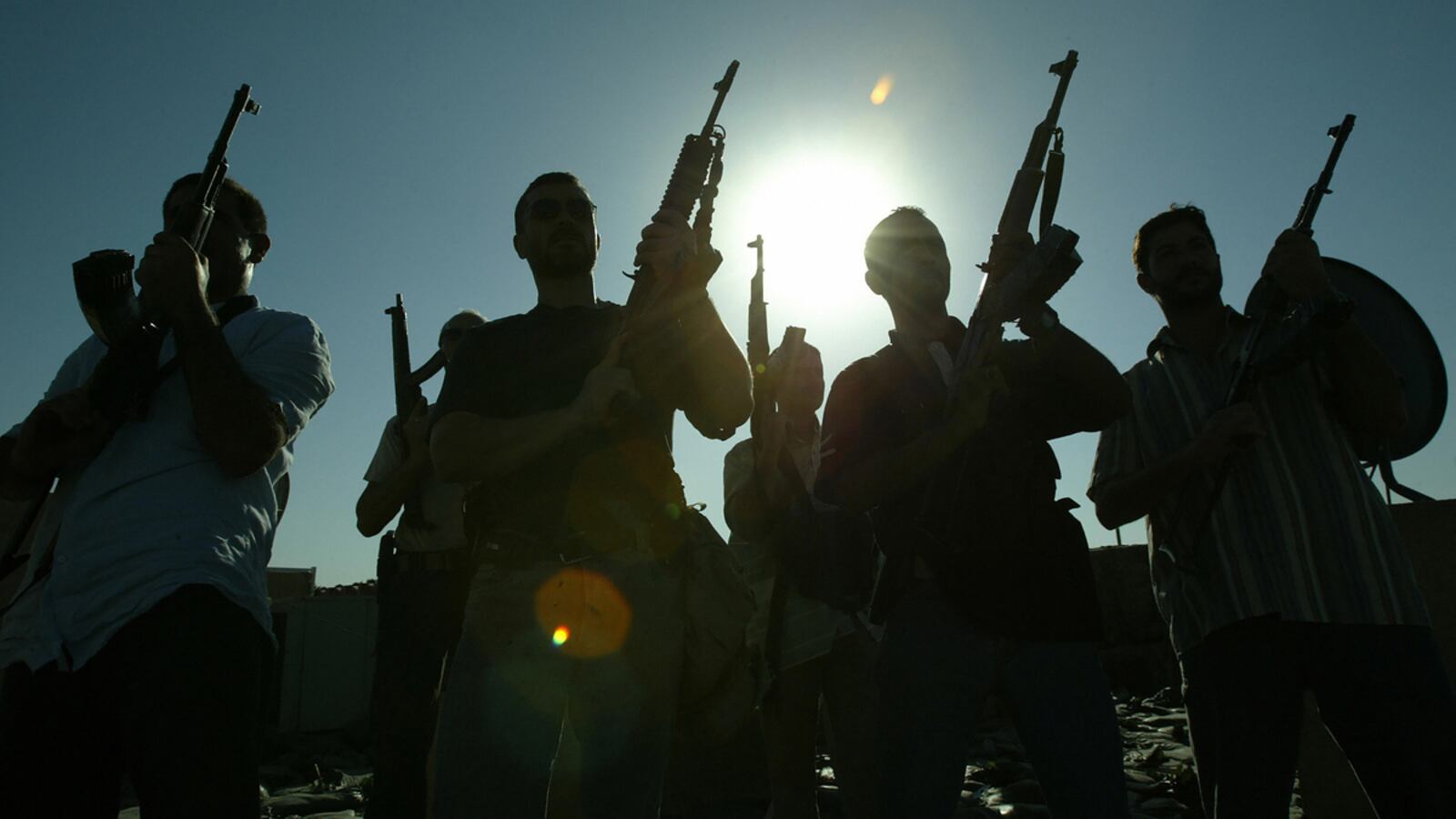Iraqis, of course, recognized President Trump’s clemency for the four Blackwater contractors who murdered 17 men, women and children at Baghdad’s Nisour Square for what it is. It is the latest reminder that they possess no rights, no matter how basic, the ascendant global superpower is bound to respect.
The Iraqi Foreign Ministry, reacting to Trump’s Tuesday night pardons of four convicted mercenaries, expressed its outrage on Wednesday. “The ministry believes that this decision did not take into account the seriousness of the crime committed and was inconsistent with the U.S. administration’s declared commitment to the values of human rights, justice and the rule of law, and regrettably ignores the dignity of the victims and the feelings and rights of their relatives,” it said. The ministry said it would urge the U.S. to “reconsider this decision.”
That’s unlikely. Nicholas Slatten, Dustin Heard, Evan Liberty and Paul Slough are now free men, as Trump long forecasted. But no clemency can ever erase what they and their Blackwater colleagues did on September 16, 2007. Blackwater, possessing a lucrative contract to protect State Department personnel in Iraq, guarded a USAID official at a compound in Baghdad when a car bomb exploded two football fields away. A convoy of mercenaries responded to a call for backup when they encountered a traffic jam at a roundabout called Nisour Square. Inconvenienced, the Blackwater convoy sprayed machine gun fire into the cars.
One of Blackwater’s bullets sheared through the head of medical student Ahmed Hathem al-Rubaie. His 46-year mother, Mahasin, a passenger in their car, watched him die in an instant. Ahmed’s car, unable to stop with a dead man at the wheel, lurched toward the circle. Blackwater responded with more fire. Many were shot trying to flee. Iraqis, including children like nine-year old Ali Kinani, died because a private army of foreigners couldn’t get where it wanted fast enough.
A State Department assessment initially and falsely claimed that Blackwater came under attack. Reporter Steve Fainaru wrote in his book Big Boy Rules that the report was drafted by a Blackwater employee. That employee wrote what mattered to him, and to the State Department: “There were no injuries to [U.S. diplomatic] personnel.” Fainaru judged, “the episode almost certainly would have been buried but for the sheer number of people whom Blackwater killed and the volcanic anger that had built up inside the Iraqi government.”
It suited the Bush administration and the U.S. military to treat Blackwater, which operated outside the military chain of command, as distinct from the Iraq occupation. Blackwater, as Nisour Square made plain, certainly operated egregiously. Its guards snorted cocaine and shot themselves full of steroids, according to a deposition from one of their dealers. The year before Nisour Square, one Blackwater contractor, Andrew Moonen, drunkenly shot dead a bodyguard for the Iraqi vice president, whom over a decade later the U.S. would help install as prime minister. While Moonen never faced charges, federal prosecutors made the Nisour Square four a rare example of American wartime accountability.
But Blackwater and their fellow military contractors were at the heart of the occupation, not the periphery. Blackwater fed from the same American logic of occupation—the same impunity—that turned even those Iraqis willing to work for the U.S. into “local nationals” who had to enter dining halls on U.S. military bases through separate doorways. Iraqis had had reason to fear the Americans at checkpoints who didn’t speak their language and possessed life-or-death power over them, and it was academic whether those Americans wore U.S. military uniforms or the short sleeves of mercenaries. It made little difference to Iraqis if the helicopters over Baghdad were Blackwater’s Little Birds or the Army’s Apaches and Chinooks. The four Blackwater guards were prosecuted; an Army officer who had his men torture an Iraqi policeman and then fired his service pistol near the man became a Republican congressman and now, as chairman of the Texas Republican Party, promotes secession. A Marine in 2007 marvelled about Blackwater, “You can't help but feel like you are in a really good action movie every time you see these guys. ... How could you lose when you have guys and toys as cool as these on your team?”
Erik Prince, the founder of Blackwater, understood with a malevolent subtlety that however angry congressional liberals were about Nisour Square, in a fundamental sense Iraqi lives did not matter to Americans. Prince played the defiant villain at an October 2007 congressional hearing, all through articulating the hypocrisy that sought to hold Blackwater accountable without condemning the rest of the occupation. “Any incident where Americans are attacked serves as a reminder of the hostile environment in which our professionals work to keep American officials and dignitaries safe, including visiting members of Congress,” Prince testified. His cynicism was vindicated three years later, when Hillary Clinton’s State Department awarded Blackwater yet another diplomatic-security contract, even after Clinton proposed to ban mercenaries.
Prince understood that it was acceptable, even respectable, to blame Iraqis for the horrors of the occupation—either their incompetent security forces or their quarrelsome politicians—rather than blame the Americans who destroyed Iraq on deceitful grounds and then claimed to have liberated Iraqis. That was how war enthusiasts like TV pundit Tucker Carlson could absolve themselves of blame. After pimping the war, Carlson found that Iraqis were no more than “semiliterate primitive monkeys,” he said in 2008—about a people who maintain one of the most vibrant literary traditions on earth—who should “just shut the fuck up and obey us.”
That was the subtext of the Iraq war, the one Donald Trump identified from the start, and it is why Fox News crusaded for the Blackwater pardons. While his positions on the war shifted in line with mainstream American opinion—for, then against, then also against a pullout when Barack Obama proposed it—Trump never lost sight of the psychological importance of ensuring that Americans no longer felt the humiliation of the futile wars they launched. He knew that the most satisfying balm for anyone feeling such humiliation would be to promise the most unspeakable forms of brutality.
That was what Trump spoke to when he talked about killing the relatives of suspected “terrorists,” about “bombing the shit” of them, about seizing their oil as imperial tribute and about banning them from entering America. The reward received by Iraqis who had helped the American military was to be stranded at airports in January 2017 holding useless plane tickets for America. Their U.S.-client government learned a similar lesson when Trump threatened to sanction it after it objected to the assassination of a senior Iranian official on its territory. Trump followed up by refusing to withdraw U.S. troops—allegedly an objective of his—because it was an Iraqi demand.
The president has not been shy about informing Iraqis—and Afghans, and Somalis, and Yemenis, and so many others—that they do not matter. The Blackwater four are hardly the only men he has given clemency for killing innocents at war. America may not be able to win its wars, but Trump’s consolation prize is to reassure Americans that they were not wrong to kill foreign unpersons; such brutality, to him, is valor. “I stuck up for three great warriors against the Deep State,” he said after last year’s wave of war crimes pardons.
It is common, after Trump commits such an outrage, to hear shocked centrist types insist that this isn’t America. Reclaiming the “soul of America” was the 2020 election message chosen by President-elect Joe Biden, who was one of the most important supporters of the Iraq war. But the soul of America is the occupation of Iraq. The occupation of Iraq was deeply American. It was the same historical force at work in the extermination of native nations; the enslavement of Africans and their descendants and then their seemingly permanent second-class citizenship; the occupations of the Philippines, Haiti, Puerto Rico, the Dominican Republic, Vietnam; the destabilization, subversion and overthrow of Latin American democratic movements that challenged or posed a challenge to capitalist interests like the United Fruit Company; the economic strangulation of Cuba for its anticapitalist defiance; the death squads that America left as “partnership” in El Salvador, Nicaragua, Guatemala, Honduras and Afghanistan. Telling Iraqis to shut the fuck up and obey, or to make them to accept the pardons of the butchers of Nisour Square, is the geopolitical equivalent of the police officer who opens fire on his Black target knowing he will never face indictment. The soul of America is a forever war.
Paul Dickinson, a North Carolina attorney, represented four Iraqis killed at Nisour Square, including 9-year old Ali Kinani, and two who survived being shot there, in a civil suit. He said his clients had told him that they believed in the U.S. legal system to get them a measure of justice, in the form of compensation.
“Now they’ve been abandoned. I think that the pardons are a slap in the face to them and a failure to acknowledge and appreciate their immense loss,” Dickinson told The Daily Beast.
“The message that this sends to them,” he continued, “and to countries around the world is that if wrongs are committed by US citizens abroad, whether it be paramilitary or military actions, that other countries may lose faith in the pillars of the U.S. justice system that is recognized around the world as being fair as unreliable even when it does the right thing, as it had done in this case.”






